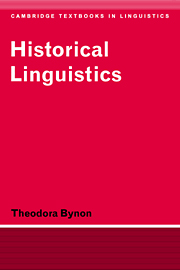Book contents
- Frontmatter
- Contents
- Key to symbols used
- Preface
- Introduction
- Part One Models of language development
- Part Two Language contact
- 4 The neogrammarian postulates and dialect geography
- 5 The social motivation of language change
- 6 Contact between languages
- 7 Language and prehistory
- Further reading
- References
- Additional bibliography
- Index
5 - The social motivation of language change
Published online by Cambridge University Press: 05 June 2012
- Frontmatter
- Contents
- Key to symbols used
- Preface
- Introduction
- Part One Models of language development
- Part Two Language contact
- 4 The neogrammarian postulates and dialect geography
- 5 The social motivation of language change
- 6 Contact between languages
- 7 Language and prehistory
- Further reading
- References
- Additional bibliography
- Index
Summary
The social stratification of language: the evaluation of linguistic variables
What is perhaps the most important contribution towards an understanding of the actual mechanism of language change has come from the detailed sociolinguistic investigation of living speech communities. The examination of the linguistic behaviour of the individual speaker within his community has proved to be of the greatest relevance to diachronic linguistics but, before we can appreciate its full significance, we must first return to what is in fact a synchronic problem, namely that of the relationship between the linguist's description of a language and the actual data upon which his description is based. As we already pointed out in the Introduction (p. 2ff.), any conventional description of a language presupposes a certain degree of abstraction or idealization of the data. Thus a description which aims at representing the linguistic competence of ‘an ideal speaker-hearer in a perfectly homogeneous speech community’ will achieve descriptive uniformity by relegating to performance all variation which is cognitively irrelevant. A corpus-based description on the other hand, which selects as its data what is considered to be a representative speech sample (for example the careful colloquial style of an educated speaker), achieves descriptive uniformity by ignoring those aspects of the language which are outside the corpus and by treating as free variants functionally equivalent forms within the corpus. Both models, then, clearly disregard a great deal of overt linguistic variation in the actual speech habits of the members of the community.
- Type
- Chapter
- Information
- Historical Linguistics , pp. 198 - 215Publisher: Cambridge University PressPrint publication year: 1977



